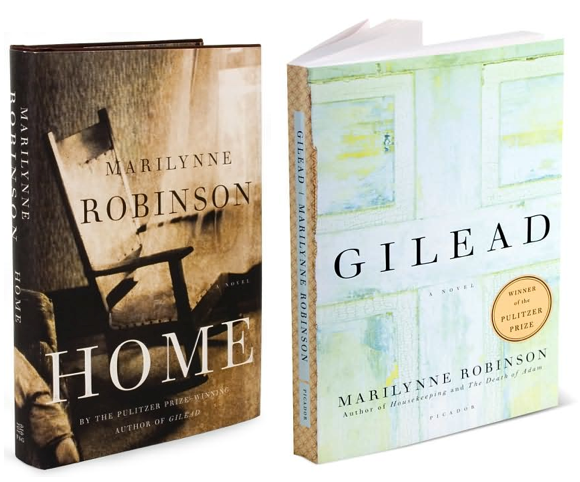Gilead and Home by Marilynne Robinson
Two good books that are better together
Status: Offer valid in DC area only

MARILYNNE ROBINSON’S “GILEAD” AND “HOME” ARE TWO GOOD BOOKS that flirt with greatness when read as one. Without “Home,” it’s difficult to understand the true measure of sadness in the stories told in both books; without “Gilead” there is no record of redemption to lighten the weight of the events that take place.
If you insist on reading just one, “Gilead” is your best bet. The book is Robinson’s inversion of “The Screwtape Letters,” or at least begins that way, with 76-year old Reverend John Ames, of Gilead, Iowa, writing an extended letter to his adolescent son. Ames knows he won’t be around to shepherd his boy into adulthood and uses the letter, to be read years later, as a way of being remembered.
It’s a credit to Robinson that even with this “Tuesdays With Morrie”-like premise, “Gilead” is the less sorrowful in this pair of books. Ames is a sentimental man, but also a good Christian, and one who knows not to try to ascribe something more tenderness than God has already provided. His stated purpose is to leave his son with his “begats,” a project that begins as a family history and spins off into reflections on faith, doubt, pastoral life, love and death. The project is further complicated by the return to Gilead of Jack Boughton, the estranged son of Robert Boughton, Gilead’s elderly Presbyterian minister, as well as Ames’ neighbor and closest lifelong friend.
If the Reverend Ames’ existence could be said to have a bane, it would be Jack Boughton. This is where “Home” comes in, by telling the story of Jack’s return after a twenty-year absence. Jack — John Ames Boughton — was named for Reverend Ames from “Gilead,” and his father Robert is a Presbyterian minister who grew up with Ames, and whose health is failing even more rapidly. The story is told through the eyes of Glory Boughton, the youngest of the eight Boughton children. She has returned to Gilead for her own unhappy reasons.
Despite its connections to “Gilead,” “Home” often feels closer to Robinson’s 1980 novel “Housekeeping.” Both are slow, quiet books in which big existential dilemmas are played out in small midwestern towns. The predominant emotion is loneliness, and there is a subtle implication that the robust American individuality is all well and good when restlessly forging the frontier, but quickly morphs into a crushing isolation once you’ve settled down in Kansas or Nebraska or Iowa. Most times, these kinds of books are tagged with a designation like: “a commentary on the banality of everyday life.” But in Robinson’s hands they are a meditation on the richness of everyday lives that only seem banal.
IT MAY BE THAT THESE BOOKS REQUIRE, at the very least, a certain soft-hearted interest in religion in general, and Christianity in particular. There is plenty of sermonizing and scriptural exegesis as Ames wrestles with forgiveness and Jack ponders whether predestination accounts for the mysterious loneliness that makes him prodigal, to his own father and to God. Hostility toward or outright dismissal of faith won’t do you much good here. It may be useful — whether you’re interested in faith or not — to begin instead with another pair of Robinson books, the essay collections “The Death of Adam” and “Absence of Mind.” This is where you will get a fuller sense of her deeply-reasoned Christianity.
It may also help to get a sense of Robinson’s cultural criticisms, which stand in stark contrast to the gentleness of her novels. Take for example, the Introduction to “The Death of Adam,” where she writes sourly that her essays “assert, in one way or another, that the prevailing view of things can be assumed to be wrong, and that its opposite, being its image or shadow, can also be assumed to be wrong.” Despite that tendency, “Gilead” and “Home” are not social novels. They are useful in a world where people use the Christian faith as an excuse for publicly burning the Koran or deciding which unforgiving and self-righteous Republican to support in the Iowa presidential primaries, just two examples of what was in the newspaper on the day I began writing this review. But the portrayal of the Christian struggles in “Home” and “Gilead” is not an endorsement or a judgment so much as a mystery, which is important. These are the stories of people trying their level best, in the face of life’s trials, to fulfill what they believe is required of them, “to do justly, and to love mercy, and to walk humbly with thy God.” Both of the books are about humility and gratitude, and this reader could not help, particularly when reading “Gilead,” but respond with the same.

[…] the people of Gilead, Iowa – is due out later this year. More of our thoughts on her are here, here and […]
[…] ISSUE, the New York Times Sunday Book Review is running an essay by Marilynne Robinson, author of “Gilead” and “Home,” about “What Literature Owes the […]